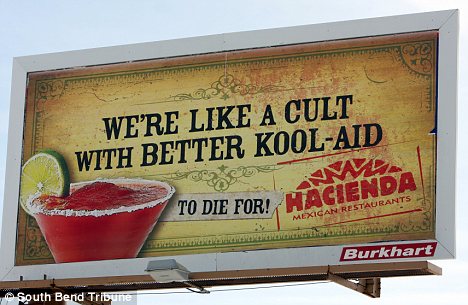
SOUTH BEND, Ind. – A northern Indiana restaurant that erected billboards referring to the 1978 Jonestown cult massacre in which more than 900 people died has removed the signs following complaints that the signs were offensive.
Jeff Leslie, vice president of sales and marketing at Hacienda, acknowledged that the billboards were a mistake. He said the South Bend-based company ordered the signs removed less than two weeks into Hacienda's new advertising campaign.
"Our role is not to be controversial or even edgy. We want to be noticed -- and there's a difference," Leslie told the South Bend Tribune. "We have a responsibility to (advertise) with care, and that's why we're pulling this ad. We made a mistake and don't want to have a negative image in the community."
The billboards included the statement, "We're like a cult with better Kool-Aid," over a glass containing a mixed drink, as well as the phrase "To die for!"

Courtesy South Bend Tribune
In November 1978, more than 900 members of Jim Jones' People's Temple drank cyanide-laced, grape-flavored punch in a mass murder and suicide in the group's compound in Guyana.
Patricia Barbera-Brown of South Bend, who lives a few blocks away from one of the billboards, said she was so shocked when she initially read the message that she drove around the block.
"I thought perhaps I had misread the sign," she recalls. "It brought back quite a few horrible images and memories, and the very notion that a local restaurant would trivialize such a worldwide tragedy to simply increase their sales of cocktails is outrageous to me, and it offended me to the core."
She sent an e-mail to Hacienda's executive telling them the billboards weren't "funny at all," calling them "extremely offensive and very irresponsible marketing."
Hacienda executives responded in writing, apologizing for offending her and informing her that the billboards would be taken down.
Like many restaurant companies, Leslie said Hacienda uses billboard advertising to connect with the community and resonate with customers. He said that company leaders look every year at their restaurants, the economy, their customers, and the competition to determine an idea or theme to use for advertising.
As they brainstormed about how people belong to clubs and teams, he said they discussed how an entity can develop a cult following of like-minded people.
"It went the wrong direction, hit a nerve, and we have come to realize we should not have done this billboard. We lose the core message," he said.
Katherine Sredl, assistant professor of marketing at the Mendoza College of Business at the University of Notre Dame, agreed that the company's message came across wrong.
"They want people to think there are more things to love there than the food, but it's not the right humor for its clientele," she said.


